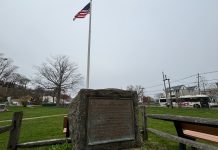By Ryan Gallagher
HOLMDEL – A Phase II meeting of the township charter commission caused some residents to question whether the process of examining the community’s current form of government was truly for the benefit of the people.
Following the commission’s March 24 public interviews with Aberdeen Township Mayor Fred Tagliarini and Asbury Park Deputy Mayor Amy Quinn, in which the sitting elected officials expanded on the pros, cons and unique elements of their municipalities’ own Faulkner Act forms of governing, Holmdel resident John Giampolo expressed his hopes that the commissioners were mindful of remarks made regarding partisan elections and the strength of mayoral powers.
“I believe it’s absurd reasoning,” Giampolo said about Quinn’s claim to support nonpartisan elections as a method that allows voters to judge candidates based on character, rather than party affiliation, while providing easier entry into campaign races for non-affiliated candidates.
“The reasoning is that nonpartisan would be more fair to candidates; that some candidates have a hard time running and getting elected and feel it’s not fair enough for them. That is a completely backwards priority,” Giampolo said. “If some Holmdel voters choose to vote down their party line, whether it’s the smartest thing to do or not, it’s still their choice and their right. It’s up to candidates to convince our voters to elect them. It’s not up to candidates to change our form of government just to make it easier for them to get elected.”
Quinn was steadfastly against the partisan election system during her interview session, stating that “partisan elections don’t provide a direct path for people to be involved in their government.”
“If you’re the best person for the job, you should have the job. If you can do it well, party lines should be somewhat irrelevant,” she said.
During his interview time, Tagliarini discussed Aberdeen’s mayoral election process, which, unlike Holmdel, is a direct public election by residents, rather than an internal selection by the governing body.
As a member of the Bayshore Mayors Association, Tagliarini said he often asks why a direct election is not a more popular option.
“People want to know who their mayor is. They want to know who they’re calling at 9 p.m. on a Tuesday when the power is down and JCP&L isn’t picking up the phone,” Tagliarni said. “I ask a lot of my colleagues, ‘Why don’t you go direct elect?’ Unless there’s an ego problem at this point. But it works well for us in Aberdeen.”
In addition to Quinn and Tagliarini, the commission previously interviewed Ocean Township Mayor Christopher Siciliano and Marlboro Mayor Jon Hornik, both of whom are registered Democrats who do not operate in a township form of government, which was noted by Holmdel resident Chris DiMare.
“They define their governments, which you are promoting as ‘strong mayor,’ not as power to the people,” DiMare said. “And the proof is in the four municipalities you brought on to your show, who used the Faulkner Act to change. The Ocean mayor is serving his sixth year. Marlboro’s mayor is serving his 15th. Aberdeen, his 12th. Asbury Park, his eighth. Holmdel is a conservative-leaning town. We already know the Faulkner Act is primarily used in the largest New Jersey cities, which are now overruled by the Democratic party. Now you’re showing us the smaller towns that are using the same playbook,” DiMare said.
The commission has met eight times this year, interviewing former and current officials from Monmouth County towns with governing bodies that differ from Holmdel’s and subject matter experts. At the March 16 meeting the commission listened to testimony from Rutgers School of Public Policy professor Julia Sass Rubin, considered one of the state’s leading experts in ballot design, according to commission chair and sitting Holmdel Township Committee person Kin Gee.
Rubin presented research that was pertinent to the commission’s examination, including a particular statistic regarding partisan elections and the impacts party lines may have at the federal, state and local level.
“No congressional incumbent on the county line has lost a primary (election) in the last 50 years,” Rubin said. She noted the average margin of victory for a candidate appearing on the county line on the ballot is 35 percent.
In a recent interview with The Two River Times, Gee said ballot design was one of the chief reasons the commission was formed, and asserted that individuals inside the township committee, other public officials and local residents had voiced concern over the partisan election process. A public question posed to Holmdel residents on a recent ballot showed 52 percent of voters were in favor of forming the charter study commission, Gee explained.
“A tight race is often a 1 percent difference between winner and loser. A 10 percent margin is a good win. So, a 35 percent advantage is almost impossible to overcome,” Gee said.
The genesis of the charter study stems from three main concerns, including the township’s mayoral election process, ballot construction, and initiative and referendum by petition.
Currently, the people of Holmdel do not directly vote for their mayor, but rely on elected committee members who choose the mayor amongst themselves. In 2016, there was public pushback after some members of the governing body noted the individual they voted for did not ultimately win the seat.
As for the concern about “initiative and referendum by petition,” a recommendation from the commission in favor of this protocol would provide voters the power to put forth referendums or public questions on the ballot. Currently, only the township committee has such power.
There are three possible alternatives to the current committee-style of government, should the commission recommend a change by the end of the study. However, the “Mayor-Council” and “Council-Manager” forms – the two most prevalent in New Jersey – are the most interesting to the commission at this point, Gee said.
For now, the commission will work to finish Phase Two interviews. Phase Three will include public discussion with commissioners, according to Gee.
“Whatever is decided will be a public question. So, a change only happens when voters vote in favor of our recommendation or not,” he said. “If it does pass, then Holmdel Township will have a new form of government.”
The commission is scheduled to meet again April 7.
This article originally appeared in the March 31 to April 6, 2022 print edition of The Two River Times.















